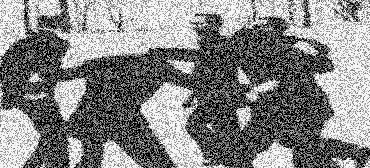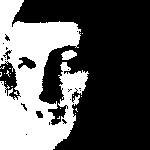|
THE
GERMAN QUESTION
A
German Band? An American Band?


The
Monks formed and performed primarily in Germany. How
much did Teutonic culture influence the band's music
and lyrics? How did ex-G.I.s react to this particular
country? This question is addressed by four of the
band members.
 Gary
Burger: The Torquays were an American
band performing in Germany with German influences
at work. Period. The Monks were an American band with
even heavier German influences shaping them but that
still didn't make us German. We were all born and
raised in the USA. But after being in Germany for
the length of time The Monks were; I, at least, began
to feel like an international citizen. I never felt
like a German. Gary
Burger: The Torquays were an American
band performing in Germany with German influences
at work. Period. The Monks were an American band with
even heavier German influences shaping them but that
still didn't make us German. We were all born and
raised in the USA. But after being in Germany for
the length of time The Monks were; I, at least, began
to feel like an international citizen. I never felt
like a German.
German
kids looked at us and what did they see? Americans.
I didn't consider myself in the German camp and neither
did they. I was a legal citizen of the United States
and intended to remain so even though the U.S.A. seemed
vague and far away at times. I don't think there was
a Monk among us who didn't believe they would eventually
return to the U.S. and get on with life in whatever
endeavour they chose. At least I wasn't hearing that
from them even though some of us had German wives.
When
I look back at my Monk experience from today's perspective,
I find that I have dear feelings about the German
people, places and friends lost due to life's fickle
vagaries (or my own stupidity) but never do I regret
being an American in an American band in Germany in
the 1960s ... even though America was starting to
catch world's hell about Viet Nam. The Monks were
protesters. Remember? Monk Time. Hey, if
some of The Monks want to say they were in a German
band that's okay with me, but I was in an American
band all the way from start to finish.
Did
the German kids understand our lyrics? Those that
could speak English probably got a good drift as to
what we were about but I don't think they were the
majority. At that time, I don't believe that a great
number of young people in Germany spoke English, even
though most or all of their schools probably had English
as a mandatory subject. If you listened to the German
Bonds singing in English you would think they were
doing it quite well and they were, in a phonetic fashion.
But once you met them, you found out that they were
not English speakers at all and that is how it was
with most German bands at work at the time. Many sang
English well, but they weren't actually fluent.
As
for the lyrics, Monk lyrics do not need to be mulled
over and dissected by every crackpot in town to discover
the meaning. The meanings are obvious. Whether we
were having fun (Drunken Maria) or being
serious (Monk Time) the meanings were right
up front.
 Eddie
Shaw: The subject of the monks is
not about being American or German. If an elephant
shits, is the shit African, East Indian, or Elephant?
If I have to talk about this subject, all I will say
is that I was there. It's a fact that there would
be no monks if there had not been the five of us and
our managers. The monks are American. The managers
and the environment were German. That doesn't make
us a German band, but we were certainly influenced
by the place. Uschie Puschie is certainly
an example of that--some crazy roller skating music
in a German beer hall. That would have never been
created in the U.S.A. Eddie
Shaw: The subject of the monks is
not about being American or German. If an elephant
shits, is the shit African, East Indian, or Elephant?
If I have to talk about this subject, all I will say
is that I was there. It's a fact that there would
be no monks if there had not been the five of us and
our managers. The monks are American. The managers
and the environment were German. That doesn't make
us a German band, but we were certainly influenced
by the place. Uschie Puschie is certainly
an example of that--some crazy roller skating music
in a German beer hall. That would have never been
created in the U.S.A.
If
The Torquays had not become the monks and had only
written the stuff' a few of us understood and were
capable of, no one would have ever heard of us. When
Polydor's producer put pressure on us to go soft and
we bowed down, to return to The Torquay formula, it
sucked and that was the end of us, thank God. Some
Germans think we are a German band, and they write
it in their articles. If you understand what Charles
Wilp is saying on the enhanced video on LET'S
START A BEAT! (the guy banging on the big gongs),
you will begin to understand that he fully recognizes
the American spirit being born in a German place.
I'll be the last person to criticize those German
believers. Some of them are proud that much of the
60's music, brought to America by the English, was
honed in Germany. There was not that much work in
England. Even The Beatles point that out in their
biography. Much of what they say about Hamburg sounds
as if it could have been spoken by the monks. In fact
some of their words sound as if they were borrowed
from my book. Some people say those English groups,
including us, came from the Hamburg school of music.
They could have a point. There was music that came
out of New Orleans. It has a certain style to it.
There are many schools of music. Chicago had its style
with Count Basie, etc. There's New York jazz and West
Coast jazz, and California psychedelic, Motown sound,
Nashville sound, Memphis sound and the British Invasion.
Many
Germans consider us as part of the German rock and
roll scene, which we were. In fact there would be
no monks if it were not for Germany. And beyond that
The Beatles and many other groups would not have gotten
to the level they did, without having played in Germany.
I sympathize with the Germans when they say, "Hey,
this music started here." As it turns out, The Beatles
became internationally known - and so did the monks.
We're Americans and our music reflects it. We didn't
dig up the old American blues in art schools as it
was done in England. We were raised in American rock
and roll, looking for a new direction, looking at
the country we were in - Germany. That avant garde
thing is German. Yes, they never understood "constipation."
That was our own little joke. Only the Americans got
it.
 Dave
Day: I'm sure you could call us a
German band, but not in the way people would think
here in America, because everybody knows that we are
Americans. When I first met Gary in 1962 down at the
service club while we were in the Army, we both had
different styles of playing. I was more rock and roll
and he was more country--but as time went on we got
to think we were hot shit together, ha ha. Even before
The Torquays, Gary and I used to take some cheap guitars
downtown to Gelnhausen and ask if we could play a
few tunes on Friday and Saturday, just for fun or
a few beers, and it worked. They were mostly G.I.
bars. Dave
Day: I'm sure you could call us a
German band, but not in the way people would think
here in America, because everybody knows that we are
Americans. When I first met Gary in 1962 down at the
service club while we were in the Army, we both had
different styles of playing. I was more rock and roll
and he was more country--but as time went on we got
to think we were hot shit together, ha ha. Even before
The Torquays, Gary and I used to take some cheap guitars
downtown to Gelnhausen and ask if we could play a
few tunes on Friday and Saturday, just for fun or
a few beers, and it worked. They were mostly G.I.
bars.
As
time went on we picked up this German fellow who could
play bass, and he was a tall dude and we got along
fine with him. He started introducing us to a more
elite group of Germans and more secluded places. We
got away from the G.I. bars and started going out
of town where it was more relaxed. I liked it. There
wasn't all this swearing and fights all the time.
I started getting to like being away from all the
American crap. I liked their ways, their food, the
shy girls--yes, those shy girls, ha! We started eating
German food and talking with the people we met and
played for.
Then
we started practicing more at the service club and
very slowly began forming The Torquays. After we left
the army the band started playing (as you know) all
around Germany; and, always being around Germans,
we started thinking like them; and pretty soon talking
like them and also yelling like them, ha ha! Eddie
married a German girl, Anita, and started talking
German and the rest of us started picking it up also
and we were becoming "Germanized."
I
figured if we were playing and living in Germany we
might as well BE German. The only time we spoke English
was when we were practicing. I started thinking in
German and everything else just fit in. So as far
as I see it, we started looking foreign and becoming
a different breed of guys that didn't even think about
being American or miss it as far as that goes.
 Roger
Johnston: The five of us came from
different places--Washington State, Illinois, Minnesota,
Nevada and Texas--a good cross-section of the United
States. And our musical backgrounds were equally representative,
ranging from country to jazz to fifties and early
sixties rock and roll. And that describes us--geographically
and musically--the way we were in Germany. Roger
Johnston: The five of us came from
different places--Washington State, Illinois, Minnesota,
Nevada and Texas--a good cross-section of the United
States. And our musical backgrounds were equally representative,
ranging from country to jazz to fifties and early
sixties rock and roll. And that describes us--geographically
and musically--the way we were in Germany.
While
living in Germany we all "went native" to a certain
degree, some more than others, but as far as musical
influence Germany had nothing to offer me personally.
Most of the bands I listened to in Germany were English
(or German bands playing English music), and all the
records were either English or American. I don't remember
listening to any music that originated in Germany
at the time. There simply wasn't any original German
rock in the early 60s or, if there was it was too
hokey to listen to seriously. That changed gradually
but after we were long gone back to pale beer and
white bread. I'm sure I was influenced by Germany
and some things German, but music wasn't one of them.
Our German managers did introduce some ideas that
drew on some German music but certainly not German
rock music. What ideas from them we did use we adapted
to our own style. For me at least The Monks were as
American as apple pie laced with good old American
LSD.
Most
of the younger people in Germany at that time had
learned English as a second language in school. I
suppose they understood the lyrics, they had no trouble
with the Stones, Beatles or Kinks. They were kids,
they were interested in music, and they were smart.
What's not to understand? Except for Cuckoo
and Higgle-dy Piggle-dy. Hell, even I never
understood THOSE two songs.

All
contents copyrighted by the Monks
|